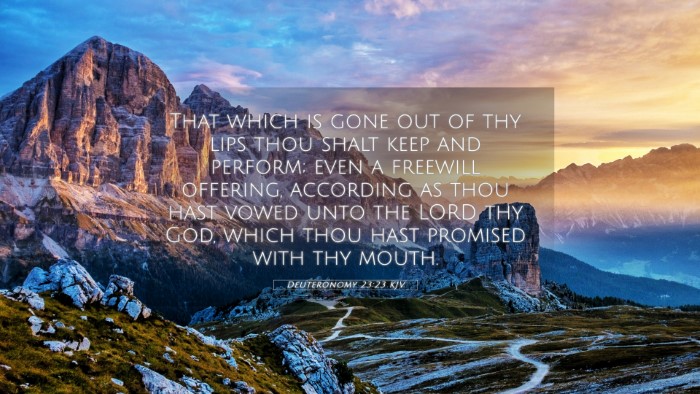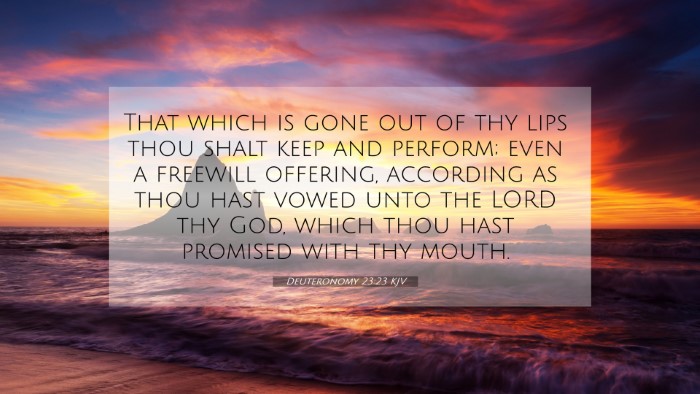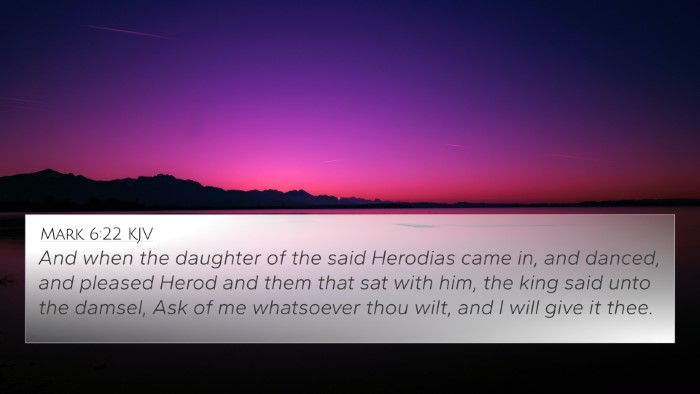Understanding Deuteronomy 23:23
Verse: "That which is gone out of thy lips thou shalt keep and perform; even a freewill offering, according as thou hast vowed unto the LORD thy God, which thou hast promised with thy mouth."
Overview: This verse emphasizes the importance of making and fulfilling vows made to God. It highlights that commitments and promises are to be taken seriously, reflecting a deep understanding of accountability in one’s relationship with the Almighty.
Meaning and Interpretation
This verse, situated within the broader context of ethical laws given to Israel, serves as a reminder of the gravity of one’s words and intentions. The insights drawn from public domain commentaries such as those by Matthew Henry, Albert Barnes, and Adam Clarke shed light on its deeper meaning.
Insights from Commentaries
- Matthew Henry:
Henry emphasizes that vows must be made with sincerity and a true heart. He warns against the casual making of promises, asserting that God expects us to adhere to what we commit, as our word reflects our integrity before Him.
- Albert Barnes:
Barnes notes that vows can be seen as acts of worship that demonstrate our thankfulness. He comments on the nature of freewill offerings as a voluntary act, reinforcing that God desires our offerings to be willingly given rather than begrudgingly.
- Adam Clarke:
Clarke points out the social implications of this verse. When one makes a vow, it also affects how others perceive their faithfulness and reliability. Thus, the fulfillment of such promises is crucial for personal and communal integrity.
Bible Cross-References
To fully grasp the implications of Deuteronomy 23:23, several other biblical verses can provide additional context:
- Numbers 30:2: "If a man vow a vow unto the LORD, or swear an oath to bind his soul with a bond; he shall not break his word, he shall do according to all that proceedeth out of his mouth."
- Psalms 76:11: "Vow, and pay unto the LORD your God: let all that be round about him bring presents unto him that ought to be feared."
- Ecclesiastes 5:4-5: "When thou vowest a vow unto God, defer not to pay it; for he hath no pleasure in fools: pay that which thou hast vowed. Better is it that thou shouldest not vow, than that thou shouldest vow and not pay."
- James 5:12: "But above all things, my brethren, swear not, neither by heaven, neither by the earth, neither by any other oath: but let your yea be yea; and your nay, nay; lest ye fall into condemnation."
- Matthew 5:37: "But let your communication be, Yea, yea; Nay, nay: for whatsoever is more than these cometh of evil."
- Luke 14:28: "For which of you, intending to build a tower, sitteth not down first, and counteth the cost, whether he have sufficient to finish it?"
- Romans 12:1: "I beseech you therefore, brethren, by the mercies of God, that ye present your bodies a living sacrifice, holy, acceptable unto God, which is your reasonable service."
Thematic Connections
Those looking to explore further into the themes connected with Deuteronomy 23:23 may want to consider:
- The importance of personal integrity and accountability to God.
- The significance of voluntary commitments as acts of worship.
- How the New Testament emphasizes sincerity in speech and promises.
Cross-Referencing Biblical Texts
For those engaged in cross-referencing biblical texts, exploring the connections to this verse can be insightful. Consider the following methods:
- Use a Bible Concordance: A comprehensive tool that lists verses alphabetically or thematically to discover related scriptures.
- Engage in Cross-reference Bible Study: Follow chains of related verses, noting how a single idea is developed throughout scripture.
- Study Cross-referenced Themes: Identify themes such as vows, integrity, and worship as they appear in both Testaments.
Conclusion
The significance of Deuteronomy 23:23 transcends its immediate message, linking believers to a deeper understanding of their commitment and relationship with God. As one seeks to explore and understand God's expectations, utilizing tools for Biblical cross-referencing can enrich one’s study and application of scripture.















